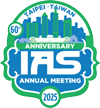IMPORTANT DATES
Feb. 28, 2025: Tutorial proposal due
March 31, 2025: Notice of acceptance
May 31, 2025: Final Tutorials Materials Due
Submission Link
The IAS AM organizing committee invites proposals for tutorials to be presented at IAS 2025.Each tutorial is 3 hours long, excluding break times. Each accepted tutorial will receive one full registration for the conference together with an honorarium of $1,000.
All tutorial proposals should be submitted via the IAS 2025 web portal under “Call for Tutorials”. Please follow the Tutorial Proposal Form on the website as a submission template. The proposals will be reviewed by a panel of subject matter experts. One or more of the following elements are strongly encouraged in the tutorial proposals:
- Industry led or co-hosted lectures
- Interactive instructor-audience approaches, including hands-on demonstrations and practices
- Application focused session on tools or methods for the practicing engineer
- Collaborative cross-disciplinary topics and tutorial teams are welcome
- Topics that engage the audience in formats that serves to communicate with the attendees
Tutorials considered to be less attractive to the audience are:
- Topics that are too narrowly focused
- Lectures that are not balanced between theory and application
- Tutorial topics or teams presented previously in immediate past IAS or other major IAS/PELS conferences
- Tutorials that narrowly focus on presenter’s own research works that are already publicly available
- Solicitation of a particular product or service
Potential Topic Areas
- Industrial Power and Energy Systems, Smart Grids, Energy Storage Systems, Carbon-neutral Power and Energy Systems
- Best practice for Data Centers, including their design, analysis, monitoring, maintenance, safety, and operation
- Industrial Power Conversion, including Electric machines, Industrial drives, Electrified Transportation Systems and Renewable and Sustainable Energy Conversion Systems
- Topologies, Modeling, and control of Power Electronic converters, devices and components
- Industrial Lighting Systems, including Sources, Display Technologies, and Drivers
- Fundamentals and Industrial Applications of Electrostatics, including Electro-hydrodynamics, Electrostatic Measurements, Computation Electrostatics, Electrostatic Precipitation and Separation, Coronas and Gas Discharges
- Smart Manufacturing, Intelligent Process Control, and Factory Automation
- Industry 4.0 and Best Practices in Industrial Automation and Control
- Regulation and Utilization of Electricity for the Control of Industrial Process including machinery, heating and electrical safety. Industrial applications in continuous process industries, including metal production, mining, petrochemical, and others
TUTORIALS COMMITTEE
- Fernando Briz, Spain
- Chia-Chi Chu, Taiwan
